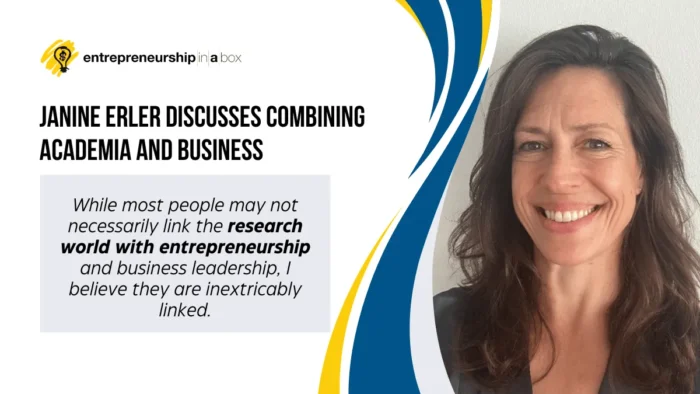Janine Erler became interim CEO of NEUmiRNA Therapeutics (a biotech firm focused on transformative disease modification specifically for neurological conditions) in 2022.
Janine Erler has a 22-year+ career in cancer research and has retained her fully-tenured Professor position at the University of Copenhagen while also heading up a commercial biotech research firm. Here’s her comment on what it takes to combine both academia and business:
My journey through cancer research has taken me from being a Ph.D. student through postdoctoral research and filing my first patents to leading my own independent research group, initially at the Institute of Cancer Research in London and then at the University of Copenhagen [group leader of the Erler Lab at the Biotech Research and Innovation centre (BRIC)].
Along the way I’ve launched my own start-ups – inspired when my postdoc supervisor sold his startup to Gilead Sciences in 2010 for $220 million. I have been the recipient of 2017 Lundbeck Foundation Young Researcher Award and other awards. I have been to Number 10 Downing Street for tea with the Prime Minister’s wife and appeared in Vogue as well as other magazines. In short, it has been quite a ride so far, and I’m incredibly grateful to the opportunities I’ve had along the way.
From Cancer Research to Business Leader
In 2022, I became interim CEO at NEUmiRNA, a company I was passionate to join thanks to its scientific excellence and outstanding founder team. We are addressing major unmet clinical needs that will go much further than symptom management and into disease modification in neurological conditions.
While Interim CEO, I maintained my position as a tenured Professor at the Biotech Research and innovation centre (BRIC), which is part of the University of Copenhagen.
This allowed me to transition into business leadership part-time while continuing my academic research into understanding how the tumour microenvironment regulates metastasis.
The Link Between Science Research Output and Entrepreneurship
While the majority of people may not necessarily link the world of research with entrepreneurship and business leadership, I believe they are inextricably linked.
There are marked similarities between the way researchers (Professor or other) need to work in order to gain support for their investigated subject. It is necessary for a scientific researcher to pitch their idea in a very similar way to an entrepreneur pitching their idea.
The difference is that, as a researcher into cancer progression, I needed to pitch my innovative idea in grant format, while a businessperson will pitch with a business plan.
And, occasionally, it is both – as with my early start-ups.
An Innovative Mindset is Needed in both Academic Research and Business
If we think of a researcher as the ‘CEO’ of their discovery findings and as the CFO of their budget, then it is easier to see that the aim of both an entrepreneur and scientific researcher is broadly similar. In addition, both need innovation to succeed – novel findings are critical for publication as well as for patenting.
For me, transitioning from academia, which includes my own independent research group, into my role as CEO at NEUmiRNA is a natural step. In some ways it feels that my work now is the culmination of everything I have achieved across my career. I am grateful to have a foot in both worlds and push frontiers on multiple levels.
I hope that the more visible we become as women in this field, the more young women will be encouraged to enter the world of science. Whether you start at a technical university or move into a scientific PhD, there are so many paths to follow within scientific research and further into entrepreneurship and business.
Combating Imposter Syndrome and Developing Self-belief
There have certainly been times during my academic career, as an entrepreneur and as a business leader that I have doubted myself. But by embracing this self-doubt and turning it into a positive driving force, I am motivated to persist.
Yes, I can feel overwhelmed, but I know that I would not have these opportunities if I could not manage them – and this has really boosted my self-belief every time I have needed it.
One of the most important aspects of transitioning from academia to the world of business is the ability to be a people person and to maintain all kinds of relationships.
This has underpinned my work ever since I started out and published my first paper. And these strategies have become second nature in my work with collaborators, every time I published an article to be peer-reviewed or researched novel treatment options.
Janine Erler – My Tips for Anyone Considering Making the Move from Academia to Business
So far, I have described my very personal journey from researching cancer cells and the tumour microenvironment, through launching my own start-ups, as tenured Professor at the University of Copenhagen all the way through to my position as CEO of a biotech.
Everyone is different, and there are many paths you can take through academia and beyond. Here are some of my tips for anyone who is considering taking the leap from a scientific PhD orientated background into the world of business leadership.
1. Get out there and network
The best way to build up the kind of trust you need with people is to network in person. It may sound old-fashioned in a world that is obsessed with being online, but I think that it is absolutely key for those who want to transition into business.
2. Your Ph.D. is important in business too
Some academics may worry about how much focus there will be in the business world on their PhD and qualifications.
The fact is that, according to the McKinsey Global Institute, less than 2% of the global population has a PhD and the world is running out of data scientists. In other words, high level qualifications in science are essential for innovative growth in business.
3. Be passionate about innovation
Having the belief in your innovative idea will power you through – if you can find a way to turn your specialist knowledge (whether already published or not) into a tangible product or service that will improve people’s lives, then you are on your way.
Remember that the world of business is about creating real-world products and services, and it is your innovative nature and forward-thinking strategies that will ensure your survival in the business world.
4. Businesses have different priorities
I think it is common for academics to naturally focus on research and not necessarily think about making money. However, business is all about making money.
Profits matter far more than how many papers have been published and in which journal. Be aware that the overarching goal of a business is to make money – as well as to find new ways to help patients.
My ultimate aim is to reduce patient suffering. In academia, I do this through discovery research and publishing high-impact papers to open the possibility of making a difference (through further funding, research, innovation, etc). In business, I do this by generating as much money as possible, which in turn facilitates progress and makes the possibility of making a difference a reality.
5. Cultivate your confidence
Being confident in yourself and your decisions is absolutely vital in the world of business.
Take responsibility and be decisive and use this to inspire confidence in your abilities. In the academic world, we are often trained to admire other researchers’ strengths over our own. By striving for perfection in order to draw the best possible conclusions from our data, we can neglect our self-belief.
It’s important to avoid imposter syndrome and find ways to champion all the aspects of your work that you are best at. Trust your instincts. Transitioning into business from academia can be tough but incredibly rewarding. I’m excited and honored to be CEO of NEUmiRNA and look forward to finding out what we can achieve.





